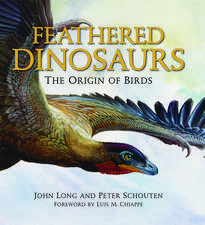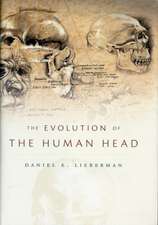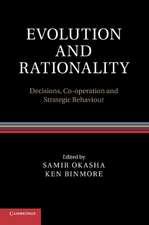Agents and Goals in Evolution
Autor Samir Okashaen Limba Engleză Paperback – 12 noi 2020
| Toate formatele și edițiile | Preț | Express |
|---|---|---|
| Paperback (1) | 177.27 lei 31-38 zile | +55.99 lei 6-12 zile |
| OUP OXFORD – 12 noi 2020 | 177.27 lei 31-38 zile | +55.99 lei 6-12 zile |
| Hardback (1) | 322.98 lei 31-38 zile | |
| OUP OXFORD – 5 iul 2018 | 322.98 lei 31-38 zile |
Preț: 177.27 lei
Preț vechi: 216.65 lei
-18% Nou
Puncte Express: 266
Preț estimativ în valută:
33.92€ • 35.42$ • 28.07£
33.92€ • 35.42$ • 28.07£
Carte tipărită la comandă
Livrare economică 24-31 martie
Livrare express 27 februarie-05 martie pentru 65.98 lei
Preluare comenzi: 021 569.72.76
Specificații
ISBN-13: 9780192894434
ISBN-10: 0192894439
Pagini: 272
Dimensiuni: 157 x 239 x 15 mm
Greutate: 0.43 kg
Editura: OUP OXFORD
Colecția OUP Oxford
Locul publicării:Oxford, United Kingdom
ISBN-10: 0192894439
Pagini: 272
Dimensiuni: 157 x 239 x 15 mm
Greutate: 0.43 kg
Editura: OUP OXFORD
Colecția OUP Oxford
Locul publicării:Oxford, United Kingdom
Recenzii
Okasha provides a convincing and valuable analysis of a particular, some might say peculiar, way of doing science. Both biologists and philosophers will have much to gain from reading this book.
Review from previous edition Agents and Goals in Evolution is essential reading for philosophers and biologists interested in subjects where reference to agency occurs, including fitness optimization, kin selection, and social evolution. It also touches on the relation between rationality and evolution, which could make it of interest to scholars working outside evolutionary biology but seeking to understand the appeal to evolution in different scientific fields.
Samir Okasha's 2018 book might well become the consensus classic text for biologists to fall back on when they find themselves unable to resist both function talk and agent talk in the course of their inquiries and explanations. It covers the ground with admirable clarity, caution and scholarship, delving in detail into the formal work by Hamilton, Maynard Smith, Grafen, Trivers and others, while also considering a wealth of theoretical and empirical research in behavioral ecology, cognitive ethology, economics and psychology.
His book is thought-provoking, and it provides an excellent entry point into an interesting multidisciplinary literature. I will certainly make use of it in the future as a reference work.
remarkably well argued and deep for a book that covers so much ground. Okasha clarifies and organizes many formerly disparate ways of using agential thinking in biology, discussing grand ideas with extraordinary clarity and subtly.
I have barely scratched the surface here of the many subtle, rich and illuminating points made in this book. Anyone with a serious interest in the foundations of evolutionary theory and the nature of evolutionary explanation will get a lot out of it, whatever their disciplinary background.
Okasha's overall discussion is admirably clear, focused, and integrative, despite ranging over literatures from evolutionary biology, game theory, rational choice theory, and the philosophy of economics. He brings much order to what can be a confusing set of issues and debates . . . those looking for a clear overview of agential thinking in the evolutionary sciences will learn much from the book, and it will be important reading for philosophers of the biological and social sciences more generally.
Review from previous edition Agents and Goals in Evolution is essential reading for philosophers and biologists interested in subjects where reference to agency occurs, including fitness optimization, kin selection, and social evolution. It also touches on the relation between rationality and evolution, which could make it of interest to scholars working outside evolutionary biology but seeking to understand the appeal to evolution in different scientific fields.
Samir Okasha's 2018 book might well become the consensus classic text for biologists to fall back on when they find themselves unable to resist both function talk and agent talk in the course of their inquiries and explanations. It covers the ground with admirable clarity, caution and scholarship, delving in detail into the formal work by Hamilton, Maynard Smith, Grafen, Trivers and others, while also considering a wealth of theoretical and empirical research in behavioral ecology, cognitive ethology, economics and psychology.
His book is thought-provoking, and it provides an excellent entry point into an interesting multidisciplinary literature. I will certainly make use of it in the future as a reference work.
remarkably well argued and deep for a book that covers so much ground. Okasha clarifies and organizes many formerly disparate ways of using agential thinking in biology, discussing grand ideas with extraordinary clarity and subtly.
I have barely scratched the surface here of the many subtle, rich and illuminating points made in this book. Anyone with a serious interest in the foundations of evolutionary theory and the nature of evolutionary explanation will get a lot out of it, whatever their disciplinary background.
Okasha's overall discussion is admirably clear, focused, and integrative, despite ranging over literatures from evolutionary biology, game theory, rational choice theory, and the philosophy of economics. He brings much order to what can be a confusing set of issues and debates . . . those looking for a clear overview of agential thinking in the evolutionary sciences will learn much from the book, and it will be important reading for philosophers of the biological and social sciences more generally.
Notă biografică
Samir Okasha is Professor of Philosophy of Science and Head of the Philosophy Department at the University of Bristol, where he has worked since 2003. He previously held positions at the University of York, LSE, and the National University of Mexico. Okasha is the author of numerous articles on topics in philosophy of science, philosophy of biology, evolutionary theory, and epistemology. His book Evolution and the Levels of Selection (OUP 2006) was awarded the Lakatos Prize for an outstanding contribution to the philosophy of science. He is currently President of the European Philosophy of Science Association.
























